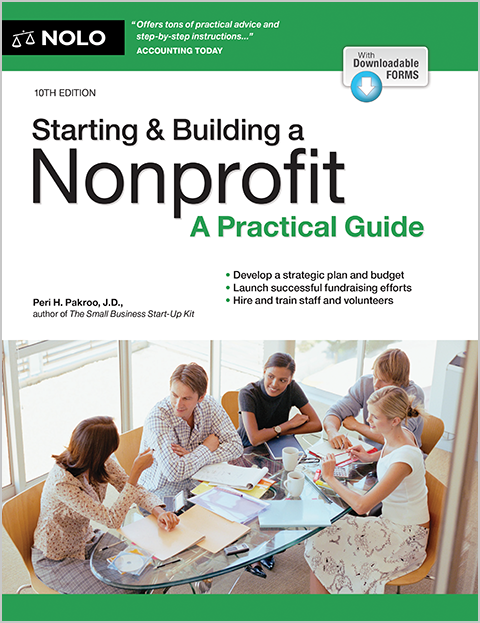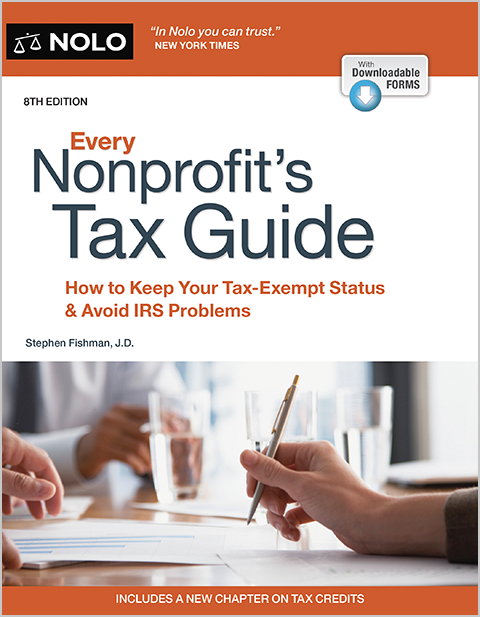Offering rewards for volunteer work can entice people to work, but make sure anything you provide won't be subject to tax.
Nonprofits often look for ways to reward their volunteers for their services. There is no tax problem when a volunteer is given rewards of nominal value such as free food and drink at a thank-you party or a certificate of appreciation. However, more substantial rewards could result in taxable income to the volunteers. For example, an award of money or a valuable gift would be taxable; that is, the volunteer would have to add the amount to their income for the year and pay income tax on it.
But there are some types of rewards that are tax-free: These are the type of tax-free fringe benefits that employers can give their employees. Most volunteers at nonprofits qualify as employees for tax purposes because they almost always work under someone else's supervision or direction. So they can get these fringe benefits tax free, just like an employee. These include the following things.
- Offering Nonprofit Volunteers Discounts on Goods and Services
- Offering Nonprofit Volunteers Parking and Other Transportation Benefits
- Offering Nonprofit Volunteers Meals and Lodging on Premises
- Offering Nonprofit Volunteers No-Additional Cost Services
- Offering Nonprofit Volunteers Education Benefits
- Offering Nonprofit Volunteers Insurance Coverage
- Other Benefits to Nonprofit Volunteers Are Taxable
- To Learn More
Offering Nonprofit Volunteers Discounts on Goods and Services
Volunteers can buy goods or receive services from the nonprofit at a lower price than the price offered to the general public. For services, the amount of the discount is not taxable if it is no more than 20% of the price charged to the general public for the service. For merchandise or goods, the discount is limited to the nonprofit's gross profit percentage on the merchandise sold times the price charged to the public for the merchandise. To figure out gross profit percentage, you calculate the total amount earned from the sale of merchandise during the year and then subtract its cost. For example, if a nonprofit sold $100,000 worth of merchandise to the public and paid $60,000 for the merchandise, its gross profit percentage would be 40% (its $40,000 gross profit is 40% of its $100,000 gross income). The nonprofit could give its volunteer-employees a tax-free discount on its merchandise of up to 40%.
Offering Nonprofit Volunteers Parking and Other Transportation Benefits
Many nonprofits provide volunteers with free parking, or reimburse them or give them an allowance for parking expenses. A nonprofit may also reimburse volunteers for the cost of using mass transit or provide them with an allowance. A nonprofit may also reimburse volunteers for the cost of using van pools. There is a monthly cap on the amount of these tax-free benefits. For the current cap, see IRS Publication 15-B, Employer's Tax Guide to Fringe Benefits.
As a result of the Tax Cuts and Jobs Act, nonprofits may be required to pay a 21% unrelated business income tax (UBIT) on parking or other transportation benefits whose value exceeds the annual cap (subject to a $1,000 annual UBIT exemption). Alternatively, the nonprofit can report the excess amount as employee compensation on which the volunteer-employee must pay income tax.
Offering Nonprofit Volunteers Meals and Lodging on Premises
As long as they are provided for the nonprofit's convenience, then the value of any meals or lodging provided on the nonprofit's business premises is not taxable for volunteers. Meals provided for the nonprofit's convenience would include, for example, where eating facilities are not close by, the meal period must be kept short, or the volunteer-employees are on call. Meals provided to improve general morale or goodwill or to attract new volunteers would not qualify for tax-free treatment.
For lodging, there is an additional requirement: It must be necessary for the volunteer to live at the nonprofit's premises in order to perform the volunteer services. For example, volunteers who traveled to New Orleans to help a community nonprofit rebuild housing destroyed by hurricane Katrina could be provided tax-free housing while they were there performing their volunteer work.
Offering Nonprofit Volunteers No-Additional Cost Services
A nonprofit that provides services to the public as part of its mission may offer the same services for free to volunteer, as long as it doesn't impose any substantial cost on the nonprofit and the volunteer is involved in providing that service. For example, a volunteer who works at a nonprofit that provides low cost health care to the poor may obtain free health care from the clinic if it can be done without any substantial additional cost for the clinic.
Offering Nonprofit Volunteers Education Benefits
Expenses for education are a tax-free working condition fringe benefit if the course (1) maintains or improves job skills, or (2) is required by the nonprofit for a bona fide business purpose, or (3) is required by law. For example, a nonprofit may pay for an accounting course for its volunteer treasurer.
Offering Nonprofit Volunteers Insurance Coverage
Volunteer-employees can be provided with tax-free health and accident insurance, and up to $50,000 in group life insurance coverage (although few nonprofits provide these types of benefits to volunteers).
Other Benefits to Nonprofit Volunteers Are Taxable
Other than what is listed above, any cash, discount, service, or benefit that a volunteer receives must be treated as taxable income and reported to the IRS. Benefits other than cash are valued according to their fair market value and then treated the same as taxable cash income.
Example: To encourage volunteers during a fundraising drive, a nonprofit offers a Hawaiian vacation to the volunteer who raises the most money. The fair market value of the vacation is taxable income. The vacation cost $2,000, so this is the amount that the nonprofit must report to the IRS and the winning volunteer must add this to their taxable income for the year.
If a volunteer is classified as an employee for tax purposes (which is usually the case except for directors), you need to pay attention to employee withholding requirements if the volunteer is paid over a minimum amount during a pay period. See IRS Publication 15-B, Employer's Tax Guide to Fringe Benefits.
To Learn More
For more information on complying with the IRS' nonprofit regulations, see our book, Every Nonprofit's Tax Guide, by Stephen Fishman (Nolo).
- Offering Nonprofit Volunteers Discounts on Goods and Services
- Offering Nonprofit Volunteers Parking and Other Transportation Benefits
- Offering Nonprofit Volunteers Meals and Lodging on Premises
- Offering Nonprofit Volunteers No-Additional Cost Services
- Offering Nonprofit Volunteers Education Benefits
- Offering Nonprofit Volunteers Insurance Coverage
- Other Benefits to Nonprofit Volunteers Are Taxable
- To Learn More



